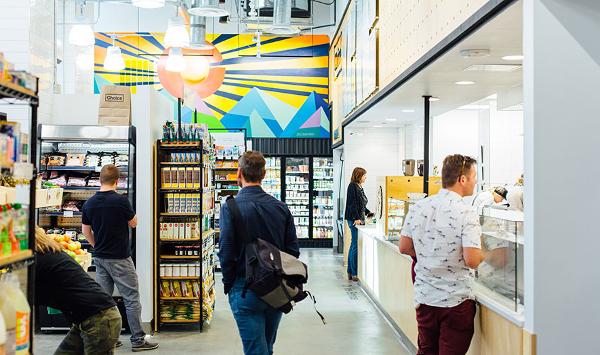The talk was all tech at the Restaurants of the Future panel at the virtual Food On Demand Conference. But Editor Tom Kaiser ended with a “sentimental” question for the panelists. Does all the technology take the human element out of the dining experience?
“Am I getting a little too emotional to be worrying about that sort of thing?” he asked about an experience where you’re picked up by your driverless Uber and whisked to the restaurant where there’s no line, and they already know what you want to eat or drink.
But Ray Reddy, co-founder and CEO of Ritual, wasn’t taking that line. “When we talk about the human experience in food, there’s good experiences and bad experiences. What we want to do is keep the good and get rid of the bad,” he said. “For example, waiting in line is never a good experience, the friction of having to do the rigamarole at the cashier. I think what people enjoy is the human connection with someone.”
Ritual is an order-ahead app that operates in five countries and is used by a few million office workers to access their local coffee, lunch and takeout spots.
Reddy said his coffeeshop clients, in particular, were worried about losing the relationship with the customer. “What they found was, often it was the opposite,” he said. “Ritual has a CRM built into it. You know their name, you know if it’s their first visit or their 50th visit.”
If an employee leaves or a new one arrives, the digital record will carry the relationship forward. “Technology can actually improve the human experience, because there’s context and history and relationships brought to the table,” he said.
Michael Manion, founder and CEO of Kitchen Podular, builds ghost kitchens, some with rooftop patios for these social distancing times, that service delivery-only customers. “We were always hitting singles and doubles and building for QSR brands,” he said, until COVID-19 hit and dine-in stopped in mid-March. “Everybody saw what they could make from delivery. They went to the hub-and-spoke model, with one main location and then small ghost kitchens
He thinks the human element is still key. “I think we build for the experience. You still need to have that aura, and you still need to create that so it’s fun cooking the food and it tastes good when it goes to the customer,” he said.
Sterling Douglass, co-founder and CEO of Chowly, a point-of-sale integration company, said investments are now flowing to technology that’s necessary rather than gee-whiz.
“In the past we saw hundreds of millions of dollars going to pizza-making robots,” which he said are “good for press releases” but didn’t really do much for restaurants. “So you saw the whole community step up. You saw different ways to do stored value and pre-paid value to restaurants to get through the shutdowns. You saw that focus shift, and it wasn’t for sales tactics, it was for making restaurants’ lives easier, and that was a shift that we were delighted to see.”
Corey Manicone, co-founder and CEO of Zuul Kitchens, a ghost-kitchen operator in New York City, said COVID-19 has sped up what he believed would be a five to 10-year process. “I thought the industry was inevitably going to be very delivery-focused, and I think a once-in-a-century global pandemic is only going to expedite that in a big way. It’s going to allow the public to be comfortable with delivery, which may not have been comfortable prior to.”
Mike Fogarty, founder and CEO of Choice Market, a combination convenience store/fast-casual restaurant/high-end grocer, said his stores have customer service reps on the floor to assist shoppers. “For us, we’re leveraging the tech not necessarily for an efficiency perspective, but for the customer experience,” he said. “If every restaurant becomes this cold, dark human-less place…for us, we want to keep that connection.
“I firmly believe that that personal connection is still paramount,” he said.


